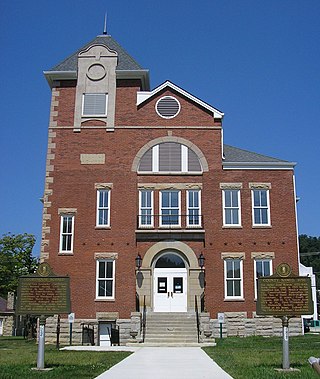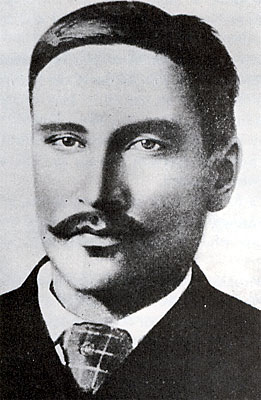
Rowan County is a county located in the northeastern part of the U.S. state of Kentucky, in the Eastern Kentucky Coalfield region. As of the 2020 census, the population was 24,662. Its county seat is Morehead. The county was created in 1856 from parts of Fleming and Morgan counties, and named after John Rowan, who represented Kentucky in the House of Representatives and the Senate. With regard to the sale of alcohol, it is classified as a moist county in which alcohol sales are prohibited, but unlike a dry county, it contains a "wet" city, Morehead, where packaged alcohol sales are allowed.

Morehead is a home rule-class city located along US 60 and Interstate 64 in Rowan County, Kentucky, in the United States. It is the seat of its county. The population was 7,151 at the time of the 2020 U.S. census.

Simon Bolivar Buckner was an American soldier, Confederate soldier, and politician. He fought in the United States Army in the Mexican–American War. He later fought in the Confederate States Army during the American Civil War. After the war, he served as the 30th governor of Kentucky.

The Hatfield–McCoy Feud involved two American families of the West Virginia–Kentucky area along the Tug Fork of the Big Sandy River from 1863 to 1891. The Hatfields of West Virginia were led by William Anderson "Devil Anse" Hatfield, while the McCoys of Kentucky were under the leadership of Randolph "Ole Ran'l" McCoy. Those involved in the feud were descended from Joseph Hatfield and William McCoy. The feud has entered the American folklore lexicon as a metonym for any bitterly feuding rival parties.

John Jordan Crittenden was an American statesman and politician from the U.S. state of Kentucky. He represented the state in the U.S. House of Representatives and the U.S. Senate and twice served as United States Attorney General in the administrations of William Henry Harrison, John Tyler, and Millard Fillmore. He was also the 17th governor of Kentucky and served in the state legislature. Although frequently mentioned as a potential candidate for the U.S. presidency, he never consented to run for the office.

John Breathitt was an American politician and lawyer who was the 11th Governor of Kentucky. He was the first Democrat to hold this office and was the second Kentucky governor to die in office. Shortly after his death, Breathitt County, Kentucky was organized and named in his honor.

Earle Chester Clements was a Kentucky politician. He represented the Commonwealth of Kentucky in both the U.S. House of Representatives and the U.S. Senate and was its 47th Governor, serving from 1947 to 1950, after serving in the state Senate. For 25 years, he was the leader of a faction of the state's Democratic Party that stood in opposition to the faction led by two-time governor and senator A. B. "Happy" Chandler.

Lawrence Winchester Wetherby was an American politician who served as Lieutenant Governor and Governor of Kentucky. He was the first of only two governors in state history born in Jefferson County, despite the fact that Louisville is the state's most populous city. The second governor born in Jefferson County is the incumbent governor, Andy Beshear.

James Turner Morehead was a United States Senator and the 12th Governor of Kentucky. He was the first native-born Kentuckian to hold the governorship of the state. A member of Henry Clay's National Republican Party, Morehead entered politics just as his party was beginning to challenge the Democratic Party's dominance in the state.

Kentucky's 5th congressional district is a congressional district in the U.S. state of Kentucky. Located in the heart of Appalachia in Southeastern Kentucky, it represents much of the Eastern Kentucky Coalfield. The rural district is the second most impoverished district in the nation and, as of the 2010 U.S. census, has the highest percentage of White Americans in the nation. It contains the counties of Bell, Boyd, Breathitt, Clay, Elliot, Floyd, Harlan, Jackson, Johnson, Knott, Knox, Laurel, Lawrence, Lee, Lincoln, Leslie, Letcher, Magoffin, Martin, McCreary, Menifee, Morgan, Owsley, Perry, Pike, Pulaski, Rockcastle, Rowan, Wayne, Whitley, Wolfe, and parts of Bath, and Carter counties. Within the district are the economic leading cities of Ashland, Pikeville, Prestonsburg, Middlesboro, Hazard, Jackson, Morehead, London, and Somerset. It is the most rural district in the United States, with 76.49% of its population in rural areas. It has been represented by Republican Hal Rogers since 1981.

Joseph Rogers Underwood was a lawyer, judge, United States Representative and Senator from Kentucky.
James Edward "Ed" Haley was a blind professional American musician and composer best known for his fiddle playing.

Charles Slaughter Morehead was a U.S. Representative from Kentucky, and served as the 20th Governor of Kentucky. Though a member of the Whig Party for most of his political service, he joined the Know Nothing, or American, Party in 1855, and was the only governor of Kentucky ever elected from that party.

The Pleasant Valley War, sometimes called the Tonto Basin Feud, or Tonto Basin War, or Tewksbury-Graham Feud, was a range war fought in Pleasant Valley, Arizona in the years 1882–1892. The conflict involved two feuding families, the Grahams and the Tewksburys. The Grahams were ranchers, while the Tewksburys, who were part Native American, started their operations as cattle ranchers before branching out to sheep.
Rowan County Senior High School (RCSHS) is located in Morehead, Kentucky, United States. The enrollment in the 2018–19 school year was 890 students. The mascot is the Viking and the school colors are green and white. Brandy Carver is the current principal.

The French–Eversole feud was a long-running dispute between two American families which occurred primarily from 1887 to 1894 in the mountains of southeastern Kentucky, mainly in the town of Hazard in Perry County. The two instigators of the feud were Joseph C. Eversole and Benjamin Fulton French, who were both merchants and lawyers and at one time were friendly. The conflict was a media sensation and was covered by many US papers at the time. The first report was in the Louisville Courier-Journal on June 30, 1886, on Page 1. A listing of the various media reports is included at the end of this article. Ultimately, those media reports became the basis for various books written about the French–Eversole War. Based on a report by General Sam Hill to Kentucky Governor Simon Bolivar Buckner, the feud killed more than 20 men. Other historians exaggerated the numbers killed to as many as 74 deaths.

William O'Connell Bradley was an American politician from the state of Kentucky. He served as the 32nd Governor of Kentucky and was later elected by the state legislature as a U.S. senator from that state. The first Republican to serve as governor of Kentucky, Bradley became known as the father of the Republican Party in Kentucky.

Feuds in the United States deals with the phenomena of historic blood feuding in the United States. These feuds have been numerous and some became quite vicious. Often, a conflict which may have started out as a rivalry between two individuals or families became further escalated into a clan-wide feud or a range war, involving dozens—or even hundreds—of participants. Below are listed some of the most notable blood feuds in United States history, most of which occurred in the Old West.

Charles H. Pearce (1817–1887) was a religious and political leader in Florida. An African Methodist Episcopal (AME) minister, he was dispatched to Florida in 1865, after the American Civil War. He had previously been a missionary in Canada after moving from Maryland to Connecticut. He helped bring the AME Church, the first independent black denomination in the United States, to Florida and worked to build its congregation during and after the Reconstruction era. In 1868 Pearce was elected as a delegate to the Florida Constitutional Convention of 1868. Later that year he was elected to the state legislature as a state senator from Leon County, Florida. He served numerous terms in the legislature, working to gain support for civil rights and public education for Floridians.
Kimberly Jean Davis is an American former county clerk for Rowan County, Kentucky, who gained international attention in August 2015 when she defied a U.S. federal court order to issue marriage licenses to same-sex couples.
















